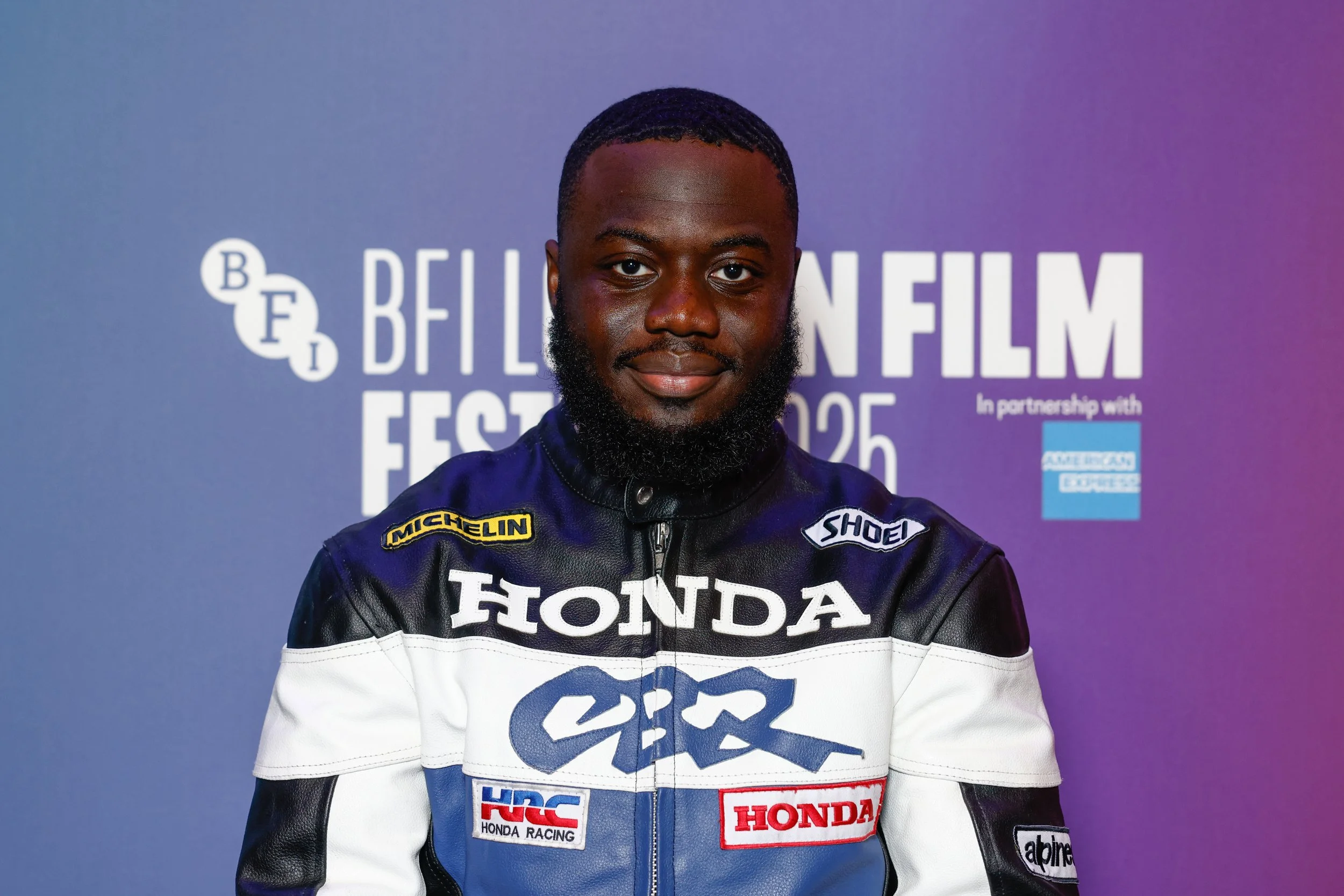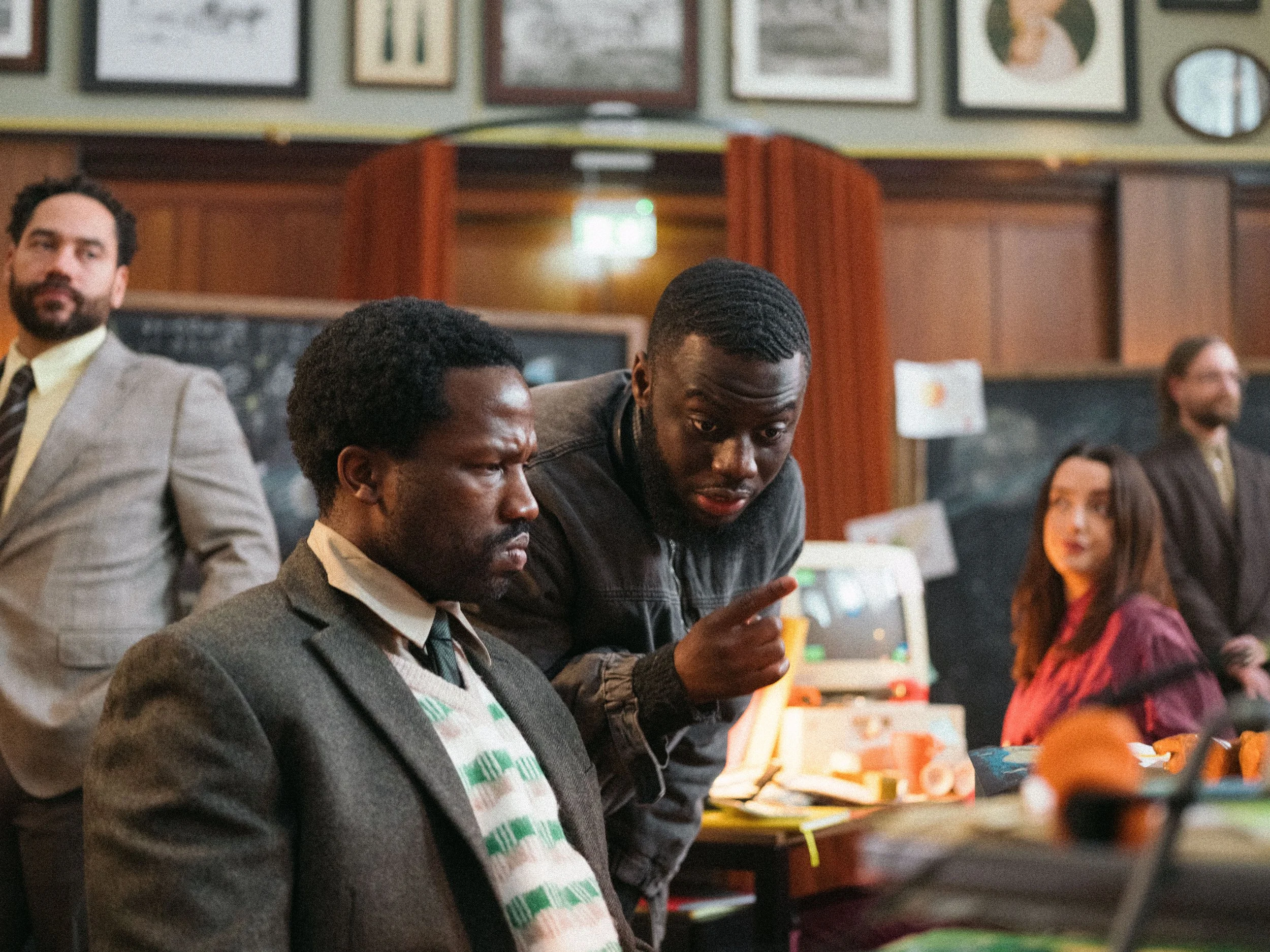
edem wornoo on his beautifully bonkers short film end of play
End of Play: World-creators, exploding heads and a five-person character are just the tip of the iceberg in Edem Wornoo’s latest masterpiece
21 Oct 2025
Molly Lipson
Edem Wornoo is a south London-based filmmaker whose background spans commercial, music videos and narrative short form. You’ll no doubt have seen his work given that he’s directed videos for some of the biggest names in grime, including Fredo, Stromzy and Dave. But Wornoo’s original passion lies in narrative storytelling, and he’s no stranger to writing and directing powerful, moving shorts that centre Black stories and communities. His previous shorts Butterfly Affect and That Door both screened at the London Short Film Festival, and he is currently in development for his first feature film with BBC Films.
His latest short film End of Play screened at the BFI London Film Festival as part of the Are You Kidding programme. It tells the story of Seven (Ṣọpẹ́ Dìrísù), a downtrodden Junior Creative at a cosmic agency that creates worlds. When he’s unexpectedly gifted the opportunity to create his dream world, he finds himself in a life-or-death race against the clock to overcome his creative block before his head explodes.
It sounds a bit bonkers because it is – in the best way. End of Play is highly entertaining and fun, but it doesn’t scrimp on a deeper message, too. Here, Wornoo speaks to Molly Lipson about the inspiration behind the film, his love of short format and how making narrative work compares to the commercial market.
Edem Wornoo at BFI London Film Festival | Millie Turner
Molly Lipson: Given your own background I’m going to assume this film is inspired at least in some part by your own experience…
Edem Wornoo: Definitely. I’d had some…let’s say tumultuous times in my work making music videos and commercials, which inspired this film. The Client is a hive mind of five individuals who preside over the agency that our lead character, Seven, works in, and they have the ability to cause worn down creatives to combust by way of critiquing them. Many a time in my own work I felt like I was about to combust as a result of the pressure and intensity.
I think as creatives, you pour a lot of yourself into what you're doing, and when you end up in a situation where it feels like they don't care the same amount as you, but they're in a position of power and they have control over this thing that you've put your all into, it can be quite painful. With End of Play I wanted to make something that was very universal to anyone that has ever worked in that pressurised environment. On top of that, we've built other layers that weave in. For example, all of the characters’ names are creation adjacent. Our protagonist Seven is linked to the Judeo-Christian creation of the world being made in seven days. Shiva is a Hindu god of the creation and destruction of worlds.
BTS | Jelani Pomell
ML: You’ve done a lot of music videos and commercials, what’s your experience in narrative work?
EW: Well, I started in narrative work, actually. Ok, originally I wanted to be a footballer, but that didn't happen – dodgy knees. I always loved stories and watching films, but I hated reading. I remember getting the 2013 Childish Gambino album Because the Internet and it came with a screenplay. That was actually the first screenplay I ever read. It was so cool, it told you when to play a certain track from the album in the script, and it was so well written. I immediately bought a book called Screenplay by Syd Field, and I learned how to write films from there. I started off by making shorts, and my mates that did music saw those and asked me to work on their music videos. So coming back to narrative work feels like a full circle moment.
ML: Do you prefer making narrative work to music videos and commercials?
EW: I think in some ways narrative work is easier. At least the way that my brain works, I understand narrative a lot better. It’s easier when you've got a character, this is their journey, and this is what you want them to do. It's a lot more difficult to just live off of the vibes in a music video, and there's a lot of pressure on the visuals. When you're making something that's more narrative, you have the leeway to be able to lean on performance or score, for example, when things don't look as good. There’s more that can carry you through in narrative work.
ML: How important do you think short film is as a medium?
EW: I think there's an interesting perspective on short films being a means to an end, a stepping stone towards features, but I don't see them that way. I always say that short films are like poetry, and features are like novels – they're completely different mediums, but they are both valid in their own way. I really do come up against that ideology that it's shorts are a means to an end, but I think that, no, they are an art form in themselves. The issue with them is that they're less lucrative. Some of my favourite directors, like Yorgos Lanthimos and Spike Jonze, have made some really cool shorts like Nimic [by Lanthimos] and I'm Here [by Jonze], and I think they’re very interesting ways to, in a compressed period of time and in a very simplistic manner, explore some themes or techniques that you want to maybe develop in the future.
Edem and Ṣọpẹ́ Dìrísù on set of End of Play | Jelani Pomell
ML: What was the biggest challenge in making End of Play?
EW: The Client character is played by five actors – which I'm never doing again, five people playing the same character that move in unison and finish each other's sentences is exactly as difficult as you think it might be. The actors were lovely, though, and they brought their all to it.
The five-actor ensemble playing The Client | Jelani Pomell
ML: The film makes use of some brilliant graphics – were those written into the script or added after?
EW: They were in the script, and I’m glad you liked them! I didn't want to have all these characters and have them say their role – that would be too obvious. I thought about how I could explain who they are in one second, and decided to use character cards that have some animation around them that essentially give you an idea into the character’s personality and what they do. I worked with an amazing artist from LA called Isabel Aspin, and the lore behind that is we were working on a music video that got canned, but we wanted to work together so in a way, End of Play is kind of like our middle finger to the system.
ML: Have you seen any shorts recently that you’ve really enjoyed?
EW: Yes for sure. I watched A Sisyphean Task (Gus Flind-Henry, George Malcher), which is a short about a young teacher in her first job, and it's about the life cycle of her relationship with her class. I do not cry, and I did not cry, I mean it (though there’s nothing wrong with crying!), but if I did cry, I would have cried at this short. Another one of my favourite shorts is called Censor of Dreams (Leo Berne, Raphaël Rodriguez) which is about these people that work in this woman's head, and they basically try to censor her nightmares into more favourable dreams. It’s got this really cool underlying theme about the trauma that we hold and try to not face. Another one I loved is called Fishing by Josie Charles and Esme Allen which is about a girl who has been trapped in a room for a number of days, and over the course of the film, you start to understand why.
Follow Edem Wornoo to stay up to date with his work.





